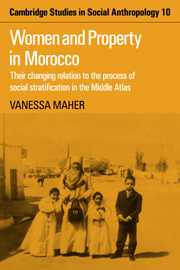 Women and Property in Morocco
Women and Property in Morocco Published online by Cambridge University Press: 27 October 2009
In this chapter it becomes clear that women play the major part not only in choosing brides for their kinsmen and acquaintances, but in carrying out the marriage rituals. This is because a girl's change in status has far-reaching implications for her female network, but a man's relationships are not affected by his marriage to nearly such an important extent. This is not to say that they remain the same but that his relations with men and with women too are governed more by his achievements in the public sphere, and his position in the labour market, than by his ascribed status. It is noteworthy, in this connection, that in the countryside, where a man's marriage means that he can set up a household which is viable in terms of labour resources, it also implies a new independence of his kin. Significantly, men participate very actively in rural weddings.
After an account of a townsman's betrothal to a ksar-girl, I discuss town marriages of various kinds, concentrating on the significance of dower as the mark of Arab status and economic autonomy. Dower entitles a man to replace his wife's kin with his own. For this reason, soldiers are generally unacceptable as husbands and affines, because a girl and her kin do not know whether, marrying a soldier, she is actually acquiring a respectable kin-group or simply being deprived of her own, for she will inevitably leave the area.
To save this book to your Kindle, first ensure no-reply@cambridge.org is added to your Approved Personal Document E-mail List under your Personal Document Settings on the Manage Your Content and Devices page of your Amazon account. Then enter the ‘name’ part of your Kindle email address below. Find out more about saving to your Kindle.
Note you can select to save to either the @free.kindle.com or @kindle.com variations. ‘@free.kindle.com’ emails are free but can only be saved to your device when it is connected to wi-fi. ‘@kindle.com’ emails can be delivered even when you are not connected to wi-fi, but note that service fees apply.
Find out more about the Kindle Personal Document Service.
To save content items to your account, please confirm that you agree to abide by our usage policies. If this is the first time you use this feature, you will be asked to authorise Cambridge Core to connect with your account. Find out more about saving content to Dropbox.
To save content items to your account, please confirm that you agree to abide by our usage policies. If this is the first time you use this feature, you will be asked to authorise Cambridge Core to connect with your account. Find out more about saving content to Google Drive.